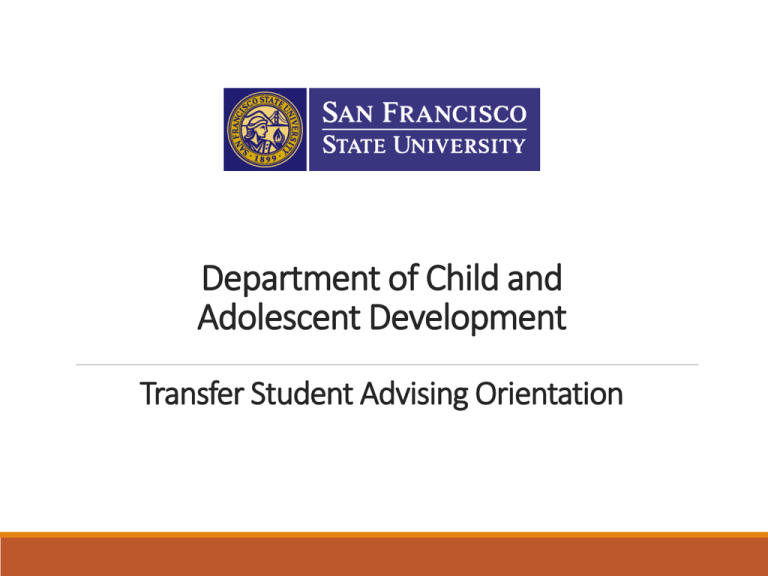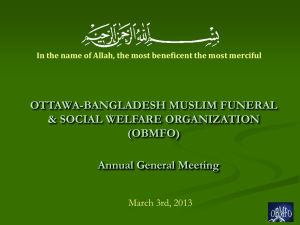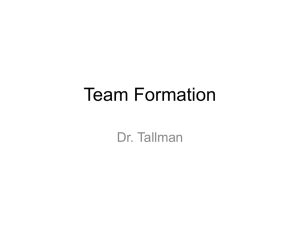Document 5267106
advertisement

Department of Child and Adolescent Development Transfer Student Advising Orientation Welcome to the CAD Major!!! For 2014-15, approximately 70% of applicants were accepted into the CAD major for all concentrations. Includes both Change of Majors and Transfer students. Higher acceptance rate this year than usual. CAD Department Mission The Department of Child and Adolescent Development (CAD) prepares students to be competent professionals in their work with children, youth, and families. CAD values teaching and experiential learning that incorporates diverse backgrounds and experiences, current and relevant research, and high quality instruction. CAD Majors are Prepared to: • Apply theory and knowledge in varied contexts • Understand issues underlying equity and social justice; respect the impact it has on the lives of children, youth, and families • Use theoretical frameworks to understand children, youth, and families Enrollment History and Current Status Fall1998: First majors admitted Fall 2009: 1000 majors Fall 2012: Impacted major status Limited to upper division students Limited to fall semester admission Fall 2013: 300 majors Spring 2015: First time admission is available in spring Bachelor of Arts Degree: Child and Adolescent Development BA degree – 45 units Interdisciplinary courses in the concentrations Four concentrations Early Childhood School Age Children Youth Work and Out of School Time Policy, Advocacy, and Systems A Focus on Knowledge of child and adolescent development Application of knowledge through in settings for children, youth and families Advising Basics Sign up at CAD Dept. Office - SCI 394 20 minute appointments during semester Drop in advising at beginning and end of semester Typical topics: Planning for upcoming semesters; planning for study abroad; academic difficulties; petitions; career planning; advice about graduate schools Read information on CAD website: cad.sfsu.edu No assigned advisors; free to meet with any advisor Advising Worksheets Bring an advising worksheet to your appointment so you can make notes on it Core worksheet is for all majors Specific concentration worksheet for your concentration Print out worksheet for your Bulletin year for CAD major See CAD website for advising worksheets: http://cad.sfsu.edu/advising#Worksheets CAD Course Policies Grade of C or higher required in all courses taken for the major (includes community college courses that are used in the major). No CR/NC accepted (except in field work course) CAD prefix course pre-requisites are enforced Policies apply to all CAD majors in all concentrations CAD Course Policies, cont’d CAD 210, 260 and ENG 214 (or community college equivalents) must be completed with grade of C or better before enrollment in CAD 410, CAD 450, 460, CAD 625, and CAD 650. No concurrent enrollment allowed. Proof of community college equivalent courses is required. CAD 410 and ENG 214 must be completed with grade of C or better before enrollment in CAD 500GW. No concurrent enrollment allowed. Proof of community college equivalent for ENG 214 is required. Core CAD Curriculum Required for All Majors I. Foundations - 9 units (Each course is required) CAD 210* Introduction to Applied Child and Adolescent Development CAD 260* Child, Family, and Community: An Ecological Perspective CAD 410 Applied Child and Youth Development (Prerequisites: ENG 214, CAD 210, CAD 260) *Or community college equivalent All core courses are 3 units Core CAD Curriculum, cont’d II. Family Systems - 3 units (Choose one) CAD 450 Understanding and Working with Diverse Families CAD 460 Globalization and Family Relations III. Research - 3 units (Required) CAD 500 Action Research Methods in Child and Adolescent Development (GWAR - Upper division writing requirement) Core CAD Curriculum, cont’d IV. Special Topics – 3 units (Choose one course from the following; if taken here, do not select for concentration) CAD 625 Child and Youth Policy CAD 650 Child Advocacy Total Units in Core – 18 CAD Concentrations CAD Concentrations o Early Childhood School Age Child Youth Work and Out of School Time Policy, Advocacy, and Systems Each student selects one concentration o Early Childhood Prepares Majors to: o Be competent in early care and education practitioners o Work with infants/toddlers in care settings o Teach preschool children o Work in schools; public and private institutions and agencies o Enter graduate school o Meet requirements for Master Teacher for Child Development Permit: California Commission on Teacher Credentialing o Early Childhood Curriculum I. Early Childhood Foundation (CAD 215 or community college equivalent) II. Child Development in Context Special Needs Infant/Toddler Development Supporting Children’s Learning III. Curriculum and Methods IV. Observation and Assessment o Early Childhood Curriculum, cont’d V. Special Issues Administration/ Leadership & Working with Families VI. Curriculum Specialties VII. *Culminating Experience CAD 610 and 611 – 150 hours field work *Must have 150 hours of verified experience in a licensed site prior to start of internship School Age Child Prepares Majors to: Enter a Multiple Subjects Teaching Credential Program Teach elementary school age children Work in schools; public and private institutions and agencies Enter graduate school CAD is one of two majors on campus to offer subject matter preparation program for a Multiple Subjects Teacher Credential. School Age Child Curriculum I. Language/Reading/Communication Development II. Literature & Oral Communication III. Mathematics IV. Science V. Physical Education VI. Social Science VII. Arts VIII. Capstone Experience (Internship) School Age Child Curriculum, cont’d Courses are offered outside of CAD department because they are subject matter preparation Hardest courses to get: COMM Capstone Experience courses – Internship courses are: CAD 600 Internship Seminar – 2 units; graded CAD 601 Internship – CR/NC; 120 hours required Youth Work and Out of School Time Prepares Majors to: Work with adolescents and families Develop, implement, and evaluate youth development programs Work as front-line staff and in leadership positions Pursue careers in education, juvenile justice, residential treatment, social services, mental health, recreation, and public health areas Enter graduate school Youth Work and Out of School Time Curriculum I. Youth and Context II. Youth Development III. Community Youth Development IV. Experiential Learning (substitution) V. Special Topics VI. Ethics (substitution) VII. Program Development and Evaluation VIII. Culminating Experience (Internship) Youth Work Curriculum, cont’d Substitutions in the following areas, upon advisement: IV. Experiential Learning CAD 430 and CAD 431 not offered VI. Ethics CAD 540 not offered VII. Culminating Experience CAD 600 Internship Seminar – 2 units; graded CAD 601 Internship – CR/NC; 120 hours Policy, Advocacy and Systems Prepares Majors to: Work in public policy, research, advocacy and public service in a variety of settings/ agencies Provide indirect service to children, youth and families Pursue post-baccalaureate degree in which advanced knowledge of theory and research methodology are required Policy, Advocacy, and Systems Curriculum I. Policy for Children, Youth, and Families II. Political and Policy Processes III. Systems and Organizations IV. Program Development, Evaluation, and Administration V. Advocacy and Community Organizing VI. Research and Statistics VII. Culminating Experience (Internship) CAD 600 and 601; 120 hours internship Internship Culminating Experience: Internship Academic, supervised experience during last semester before graduation Opportunity to apply theory and knowledge to practice in a professional setting Expand students’ knowledge of professional practice, expectations, and behaviors Interact with working professionals over time in professional setting Internship, cont’d Apply one semester prior to desired internship Check CAD website for deadlines and forms http://cad.sfsu.edu/internships No late applications accepted; no exceptions Handbook, lists of possible sites, contracts, code of ethics, and FAQs are on website for your review. A minimum of 30 units must be completed in CAD core & concentration prior to start of fieldwork. Internship, cont’d All core foundations courses must be completed prior to start of internship. In EC concentration, CAD 215 or equivalent also must be completed prior to start of fieldwork. CAD 600 (2 units) and 601 (2 units) for all concentrations except EC. EC takes CAD 610 and 611. Additional Programs CAD Metro Academy For incoming freshmen who are interested in CAD http://metro.sfsu.edu CAD PATH Program Supports professionals working in the field of early childhood education to earn a Bachelor's degree http://cad.sfsu.edu/path ◊ CAD Metro Highlights ◊ Cohort model ◊ Complete General Education requirements (such as English and Math) with classes that use interesting, real-life early childhood education challenges as examples. ◊ Academic advising to help students stay on track with the right courses to earn their degree in a timely manner ◊ Tutoring for English, Math & Science courses ◊ CAD Metro Highlights, cont’d ◊ Participation in Metro Child and Adolescent Development will help participants preparing for admission into the Child and Adolescent Development Major http://metro.sfsu.edu o CAD PATH Program Benefits: o Meets every other weekend Friday evenings (approx. 5:30- 10) and Saturdays (approx. 8:30-6) – 3 courses per semester with cohort o Structured pathway to help you graduate in a timely manner o Provides students with personalized support for college success through mentoring and tutoring o CAD PATH Program, cont’d Eligibility: o Work or be willing to work at least 20 hours a week in an early childhood education center-based or family child care program o CAD major with a concentration in EC http://cad.sfsu.edu/path CAD Faculty – Tenured/Tenure Track Alison Baroody, Ph.D. – Assistant Professor Rene F. Dahl, Ph.D. – Professor and Chair Soyeon Park, Ph.D. - Associate Professor Kristen Pozzoboni, Ph.D. – Assistant Professor CAD Faculty - Lecturers Nadine Agosta, Ed.D.- Internship Coordinator Melinda Ramzel, MPH, ABD – PATH Coordinator Elaine Schilling, MPA Lygia Stebbing, Ed.D. – Metro Coordinator For More Information… Websites: www.sfsu.edu http://cad.sfsu.edu http://cad.sfsu.edu/path http://metro.sfsu.edu Email: cad@sfsu.edu Phone: 415-405-3564 Questions?







